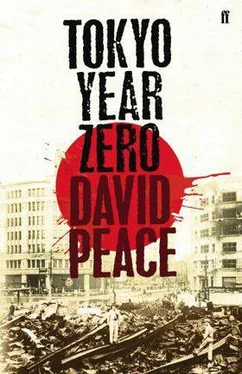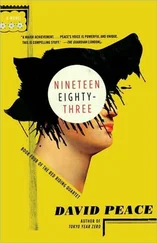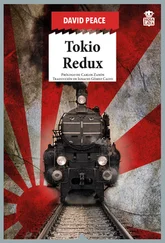I think about her all the time …
It takes over an hour to reach Yūraku-chō station and then it takes a fight to get off the train and onto the platform –
I scratch. Gari-gari . I scratch. Gari-gari …
I walk from Yūraku-chō station down to Police HQ. I itch and now I sweat and it is not yet 6 a.m. and Tokyo stinks of shit; shit and dirt and dust, the shit and the dirt and the dust that coats my clothes and coats my skin, that scars my nostrils and burns my throat with every passing jeep, every passing truck –
I stop. I take out my handkerchief. I take off my hat. I wipe my face. I wipe my neck. I stare up at the bleached-white sky, searching for the invisible sun hiding somewhere up above the clouds of typhus, the clouds of dust, of dirt –
Of shit, of human shit …
The side of the road is littered with people on mats, men and women, young and old, soldiers and civilian, their eyes blank or closed, exhausted –
My fists ball, my chest constricts, my lungs scream, What are you waiting for?
It has been one year since people knelt upon the ground across the moat and wept. It has been one whole year, but still the people are on their knees, on their knees, on their knees, on their knees –
Get off your knees! Get off your knees!
*
Ishida is back. Ishida is cleaning Room #2, wiping down the chairs and the tables, sweeping up the floor and the doorway, straightening the telephones that can’t ring and dusting the fans that can’t turn –
Ishida is too young for this room, for this work, this place, but his family have connections, connections that have kept him alive and given him this job in this place and he is grateful and eager to prove himself, his face permanently to the floor, his back slightly bent, he is here to clean and make the tea, to make the tea and take our shit –
‘This is disgusting! The worst tea I’ve ever tasted!’ Fujita is shouting at Ishida; Fujita spitting his tea across the desk –
Fujita is back too. Fujita always comes back –
Late forties. Passed over and bitter …
Detective Fujita knows he should be the head of this room, knows I am too young for this position, for this work, this place. But Detective Fujita knows my family had connections, connections that have kept me alive and given me this job in this place –
In his place. But Detective Fujita knows –
No one is who they say they are …
Ishida apologizes. Ishida mops up the tea Fujita has spit out on the desk. Ishida apologizes again –
‘Don’t apologize like that,’ shouts Fujita. ‘Your apologies are always insincere. Your apologies make me feel worse than your silence. Apologize sincerely!’
Ishida has his face to the floor, his back bent. Fujita smacks the top of Ishida’s head. Fujita pushes him through the door, out of the room into the hallway –
‘You stay out there until you learn how to make decent tea!’
Ishida is on his knees in the hallway. Ishida is apologizing –
Fujita turns his back on him. ‘And learn how to apologize with some sincerity!’
I follow Fujita back into the room. I say, ‘Good morning.’
‘Good morning,’ he mumbles. ‘You got a cigarette?’
I shake my head. I ask him, ‘How was yesterday?’
‘I hate the countryside,’ he says. ‘And country people.’
I nod. I ask, ‘They fleece you?’
‘They tried,’ he laughs. ‘Until they found out I was a policeman and then I quickly managed to get some bargains.’
I point at the doorway. I ask, ‘Did Ishida turn up?’
‘Unfortunately,’ says Fujita. ‘No use, as usual.’
‘But you got some rice? Some supplies?’
‘Yes,’ he says, and then, ‘Thank you.’
I shrug. I say, ‘For what?’
‘For covering for us.’
‘It’s nothing.’
‘No, but I heard about Shiba Park, about your two bodies. That was bad luck. And I heard they were asking where I was.’
I shrug. I say, ‘Forget it. You’d do the same for me.’
Fujita bows slightly and says, ‘Of course.’
I look at my watch. Chiku-taku . I am late, again.
*
I knock on the door to the chief’s office. I open it. I apologize. I bow. I take my seat at the table; Chief Kita at the head, Adachi and Kanehara to his right, Kai and I on the left; the same people, the same place, the same time and the same two conversations every day –
The rumours of purges and SCAP’s so-called reforms –
In October last year, following the issuance of SCAPIN 93, forty-seven out of fifty-one prefectural police chiefs were purged along with fifty-four superintendents, one hundred and sixty-eight inspectors, one thousand assistant inspectors, one thousand, five hundred and eighty-seven sergeants and two thousand, one hundred and twenty-seven patrolmen, each of these assistant inspectors, sergeants and patrolmen being members of the disbanded Tokkō —
In January this year, following a new Purge Directive known as SCAPIN 550, two further police chiefs lost their jobs along with sixty superintendents and twenty-eight inspectors —
This Purge Directive not only removes men from public office, it also disqualifies them from all other positions –
And the Victors have not finished —
‘I was talking with this old friend from Nerima last night,’ says Chief Inspector Kanehara. ‘And he was telling me that SCAP sent the Public Safety Division into the Nerima police station to check the career histories of every single police officer in the building, the dates of all their transfers and appointments…’
‘Why Nerima?’ asks Adachi –
Or Anjo or Ando or …
‘Because some uniformed patrolman complained directly to SCAP that last August, just after the surrender, some former high-ranking Tokkō and Kempei officers at Nerima had changed their names to those of dead or retired men and then transferred to other, better positions and ranks under their adopted new names…’
No one is who they say they are …
‘While men who had served in the Tokkō and Kempei sections for only a few months were now being purged…’
No one who they seem to be …
‘Snitch!’ spits Adachi –
And everybody nods –
Except me …
Now the talk around the table turns to an overnight spate of muggings in the Setagaya area, of a three-man gang with handguns, of possible connections to last month’s armed burglaries in the same area of Tokyo, of the continuing rise in violent crime, the use of guns when we have none and back then to SCAP’s so-called reforms –
‘We’ve asked them for guns,’ says Kanehara. ‘More guns. Better guns. Guns that work. Guns with ammunition to match…’
‘And they’ve promised us guns,’ says Adachi –
‘But that’s all they’ve done,’ says Kanehara –
The same people, the same place, the same time and the same two conversations every day, meeting after meeting, until there is a knock on the door, until there is an interruption –
‘Excuse me,’ mumbles the uniform –
‘What is it?’ barks Chief Kita –
‘The mothers are here, sir.’
*
It is 8:30 a.m. on the day after the bodies were discovered and there are already twenty mothers here. Twenty mothers who have read the morning paper or heard the news from neighbours. Twenty mothers who have taken out their last good kimonos. Twenty mothers who have called upon their other daughters or their sisters. Twenty mothers who begged the streetcar or train fare to Sakuradamon –
Twenty mothers looking for their lost daughters –
‘They’re quick enough to read the papers,’ Kai is telling me. ‘Quick enough to come down here, but where were they when their daughters went missing? They’re too late now…’
Читать дальше












